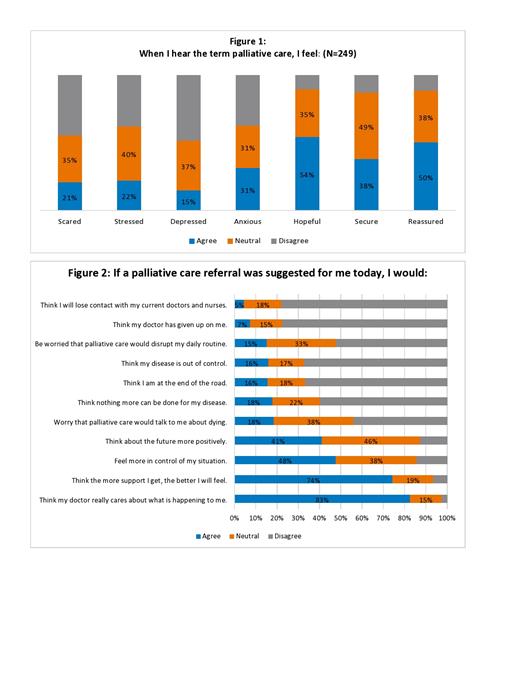Abstract
Background: Palliative care (PC) benefits patients with cancer and those undergoing hematopoietic stem cell transplantation (HSCT), but remains under-utilized in HSCT. While transplant physicians have substantial concerns regarding how patients perceive PC, studies examining HSCT recipients' perceptions of PC are lacking.
Methods: Between 11/2020-4/2021, the CIBMTR Survey Research Group conducted a multi-site cross-sectional survey of adult autologous and allogeneic HSCT recipients at 11 transplant centers in the United States who were 3-12 months post-transplant to assess their experience, knowledge, and perceptions of PC. Using validated questionnaires, we assessed patients' familiarity with PC, knowledge and perception of PC, unmet PC needs, quality of life, and symptom burden. We computed a composite score of patients' perceptions of PC (mean = 48.8, SD = 12.2). We used a generalized linear regression model to examine factors associated with patients' perceptions of PC.
Results: Of 359 potentially eligible patients, 250 (69.6%) enrolled in the study and 249 were eligible for analysis. Median participant age was 58.1 years (IQR 16.6). Most were white (85.9%), non-Hispanic or Latino (95.2%), and male (53.0%). Overall, 63.1% underwent autologous HSCT. The most common diagnoses were multiple myeloma (42.2%), lymphoma (22.1%), leukemia (16.9%), and MDS/MPN (12.4%). Overall, 44.2% (110/249) of patients reported limited knowledge about PC and 51.0% (127/249) endorsed being familiar with PC. Most patients stated that when they hear the term PC, they feel hopeful (54%), and reassured (50%) while a minority reported feeling scared (21%), stressed (22%), or depressed (15%) [Figure 1]. Most endorsed that when a PC referral is suggested for them, they think their doctor really cares about what is happening to them (83%), and only 7% of patients stated that when a PC referral is suggested, they think their doctor has given up on them [Figure 2]. In multivariate analyses, patients who were more knowledgeable about PC were more likely to have a positive perception of PC (B = 7.54, SE=1.61, P < 0.001) compared to those who had less knowledge about PC. Patients with postgraduate education were more likely to have a negative perception of PC (B = -5.55, SE=2.60, P = 0.034) compared to those with high school education or less. Patients' demographics, HSCT type, diagnosis, unmet PC needs, quality of life, and symptom burden were not statistically significantly associated with their perceptions of PC.
Conclusions: A substantial proportion of HSCT recipients report limited knowledge and familiarity with PC. Most patients reported positive perceptions of PC, and those who were more knowledgeable about PC were more likely to have positive perceptions of PC. These data do not support transplant physicians' concerns about how patients perceive PC and underscore the need for future interventions to further educate patients about PC to overcome barriers to PC utilization in HSCT.
Burns: Astellas Pharma Inc.: Research Funding; Medac GmbH: Research Funding; Sanofi: Research Funding; OncoImmune: Research Funding; Fate: Research Funding; Bristol Meyers Squibb: Research Funding; PrioThera: Research Funding; Kyowa Kirin International: Research Funding. Murthy: CRISPR Therapeutics: Research Funding. LeBlanc: Amgen: Consultancy, Other: travel; Pfizer: Consultancy, Other: Advisory Board; AstraZeneca: Consultancy, Honoraria, Other: Advisory board, Research Funding; Flatiron: Consultancy, Other: Advisory board; Agios: Consultancy, Honoraria, Other: Advisory board; Travel fees, Speakers Bureau; BMS/Celgene: Consultancy, Honoraria, Other: Travel fees, Research Funding, Speakers Bureau; Daiichi-Sankyo: Consultancy, Honoraria, Other: Advisory board; AbbVie: Consultancy, Honoraria, Other: Advisory board; Travel fees, Speakers Bureau; Helsinn: Consultancy, Research Funding; Duke University: Research Funding; Jazz Pharmaceuticals: Research Funding; UpToDate: Patents & Royalties; NINR/NIH: Research Funding; CareVive: Consultancy, Other, Research Funding; Otsuka: Consultancy, Honoraria, Other; American Cancer Society: Research Funding; Seattle Genetics: Consultancy, Other: Advisory board, Research Funding; Astellas: Consultancy, Honoraria, Other: Advisory board; Heron: Consultancy, Honoraria, Other: advisory board.


This feature is available to Subscribers Only
Sign In or Create an Account Close Modal